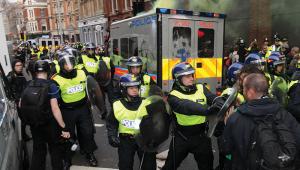22 February 2002
English councils face the prospect of double-digit rises in council tax to fund police services after claims that David Blunkett's national policing plan is incompatible with local forces' commitments for 2002/03.
Councils are due to announce their tax levels over the next six weeks. But it has been revealed that police chiefs asked the home secretary to guarantee that tax rises would not be capped, so that they could meet their financial commitments.
The problem, the Association of Police Authorities said, stemmed from the 6.1% settlement for police forces across England and Wales.
The association said that a large proportion of the increase had been ring-fenced so that forces could implement the 'huge demands' of Blunkett's national policing plan. Top-sliced funding had placed severe pressure on local services, which could be funded only through large rises in local taxation, the organisation added.
APA chair Ruth Henig warned Blunkett that the average local priorities would be 'significantly outstripped' by pay and pension considerations alone. She estimated that total revenue expenditure by police authorities would have to increase next year by more than £370m just to stand still. That is before the increased cost of services that lay outside the ring-fenced budget, such as new IT systems, are considered.
Henig added: 'The shortfall will be met by a combination of above-inflation increases in council tax – double figures in many areas – and budget cuts.'
Leicestershire County Council told Public Finance that it had already agreed a 23% police precept rise in order to maintain 'essential services'. Other authorities are rumoured to be implementing 50% increases in precepts.
PFfeb2002


















